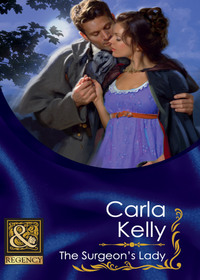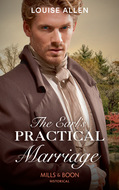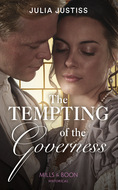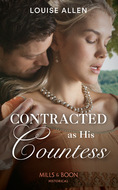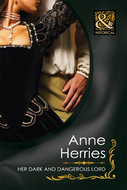Książki nie można pobrać jako pliku, ale można ją czytać w naszej aplikacji lub online na stronie.
Czytaj książkę: «The Surgeon's Lady»

Praise for Carla Kelly, recipient of a Career Achievement Award from RT Book Reviews and winner of two RITA® Awards
‘A powerful and wonderfully perceptive author.’
—New York Times bestselling author Mary Jo Putney
‘A wonderfully fresh and original voice …’
—RT Book Reviews
‘Kelly has the rare ability to create realistic
yet sympathetic characters that linger in the mind.
One of the most respected … Regency writers.’
—Library Journal
‘Carla Kelly is always a joy to read.’
—RT Book Reviews
‘Ms Kelly writes with a rich flavour that
adds great depth of emotion to all her
characterisations.’
—RT Book Reviews
About the Author
CARLA KELLY has been writing award-winning novels for years—stories set in the British Isles, Spain, and army garrisons during the Indian Wars. Her speciality in the Regency genre is writing about ordinary people, not just lords and ladies. Carla has worked as a university professor, a ranger in the National Park Service, and recently as a staff writer and columnist for a small daily newspaper in Valley City, North Dakota. Her husband is director of theatre at Valley City State University. She has five interesting children, a fondness for cowboy songs, and too many box elder beetles in the autumn.
Novels by the same author:
BEAU CRUSOE
CHRISTMAS PROMISE
(part of Regency Christmas Gifts anthology) MARRYING THE CAPTAIN
The Surgeon's
Lady
Carla Kelly

MILLS & BOON
Before you start reading, why not sign up?
Thank you for downloading this Mills & Boon book. If you want to hear about exclusive discounts, special offers and competitions, sign up to our email newsletter today!
Or simply visit
Mills & Boon emails are completely free to receive and you can unsubscribe at any time via the link in any email we send you.
Dedicated to the men of the Channel Fleet,
whose wooden walls kept the Corsican Tyrant
from England’s shores
Primum non nocere—First do no harm.
Credited to Galen, Roman physician,
and English physician Sir Thomas Sydenham
Chapter One
Taunton, June 28, 1809
For several months Lady Laura Taunton had avoided the desk in her sitting room because of two letters, one inside the other, she had not the heart to destroy. She had thrown them away one evening, but retrieved them before the maid did her early morning tidying. She shoved them back in the desk before continuing her restless slumber.
Suddenly, the letters mattered. She blamed her change of heart on her nearest neighbor, who had invited her to tea. Lady Chisholm probably had no idea of Laura’s feelings. She merely wanted to drink tea and share a happy event.
Laura had dressed with deliberate care for the tea. It was a year since death had released Sir James Taunton from the apoplexy that had turned him into a helpless infant, and made her his nurse for the previous three years. She would dress in gray this afternoon, signaling a departure from black, which she hoped fervently, if unrealistically, never to wear again.
She hadn’t missed James for a minute, but no need for the neighbors to know. A widower thirty years her senior, James had paid attention when her father, William Stokes, Lord Ratliffe, had shared her miniature around his circle of acquaintances and promised her to the highest bidder.
She had been eighteen then, a student at Miss Pym’s Female Academy in Bath, sent there by her father for an education, with no idea that he would demand so high a return on his investment.
“My dear wife was never able to give me an heir,” James had told her after their wedding. “Your duty is to give me an heir.”
During the first year of her removal to Taunton, a country seat near Bath, Laura had asked herself daily why she had not bolted from school at the mere idea of what her father had planned. During those nights when James Taunton heaved, gasped and thrust over her, she cursed her own weak character.
She did not become a mother, for all James’s attempts that consumed his energy and left her feeling no satisfaction beyond relief when he finished and left her room. When he suffered a stroke while out riding, his groom carried the baronet back to the house, practically dropping Sir James at her feet like a game bird. She hoped the staff saw her calm acceptance as well-bred courage, rather than gratitude.
Stung by her own faulty character, she had thrown herself into nursing her husband. By year two of his apoplexy, she could have challenged anyone to improve upon her delivery of competent care. She conducted herself with dignity when he died, and dressed in black. Beyond tea at Chisholm, that was her world.
That was a year ago. This afternoon, she had walked to Chisholm, happy not to be suffocating in black. Tea with Lady Chisholm usually demanded no more of her than to nod and interject the occasional short word. But this afternoon, Lady C had dealt her a blow. Sitting right next to her neighbor and holding her hand, was a slightly younger version of Lady Chisholm.
As Laura had hesitated, Lady Chisholm waved her closer. “Do forgive me, my dear. It’s just that …” She glanced at her sister and burst into tears. “This is my sister and it has been so long.”
It was simply said, but Laura felt her heart pound from the look the sisters exchanged. What have I done? Laura thought. Then: Can I change it?
Not wanting to startle her own servants when she returned to Taunton, Laura allowed the tears to slide down her face in silence. She had perfected this art through many a night in her late husband’s bed. By the time she reached the estate, hers alone now, she was in control again.
She had a moment of panic when she could not find the letters. She reminded herself that it had been three months since she had retrieved them, and dug deeper in her desk. She sighed when she unearthed them.
She held up the first one, the only one she had had the courage to read in March. Read this first! had been scrawled across the folded sheets in Miss Pym’s handwriting. Even after eight years and a supreme dislike of Pym, Laura had obeyed.
She read it again, knowing the news still had the power to shock her. She read again of Lord Ratliffe’s dealings with the Female Academy and his relationship to Pym, his illegitimate sister. Her breath came faster as she read again Pym’s news that she had two half sisters. You are too old now to remember Polly Brandon, she read again, but perhaps you recall Eleanor Massie. Eleanor was now Eleanor Worthy, wife of a captain in the Royal Navy, who had somehow managed Lord Ratliffe’s incarceration in a Spanish prison, as part of a botched hostage exchange. “Good riddance,” Laura said. The Worthys had gone to Bath because Lord Ratliffe had told the captain, probably to taunt him, Laura thought sourly, his wife was one of three illegitimate daughters educated by Miss Pym. Pym had written,
Eleanor has told Captain Worthy her whole history, and they are here to find her sisters—Polly Brandon, who still resides here, and you, Lady Taunton.
Laura put down the letter and stared at the ceiling, remembering her relief when she read Pym’s confession that Eleanor had not succumbed to a fate similar to the one Lord Ratliffe had proposed to her, but had fled Bath with nothing but the clothes on her back.
She had a place to go, Laura thought. I had nowhere and no one. Still, it couldn’t have been much rosier for Eleanor. She looked at Miss Pym’s letter again, with its concluding paragraph, urging her to read Eleanor’s accompanying letter.
That was the letter she had not opened, too humiliated by her own circumstances to think anyone, even a half sister, would ever want to contact someone who hadn’t her own strength of character. Why would she want to know me? This time, though, she took a deep breath and opened Eleanor Worthy’s letter.
Her eyes welled with tears. If Eleanor had begun it formally, Laura could have resisted, but she had not. Laura let out a shuddering breath. Oh, sister, the letter began. I want to meet you.
Laura was on her way to Plymouth by noon the next day. She didn’t write ahead, knowing that if she had to put pen to paper, her courage would fail her completely.
Laura arrived in Plymouth when farmers were leaving their fields and shopkeepers shuttering up for the night. Nana Worthy, that was how she signed her name, had included directions to the Mulberry, and the coachman got lost only once. She wished he had been lost another two or three times, because her misgivings had begun to flap overhead like seagulls.
There was the Mulberry, small and narrow, but well tended. The paint on the door and windows lookednewly fresh, and she had to smile at the pansies in their pots and ivy making its determined way up the walls. It must be the inn that won’t die, Laura thought, with amusement.
She told the coachman just to wait, and shook her head against an escort up the walk. There was nothing wrong with her legs, only her resolve. A small sign in the door’s glass said Please Come In, so she did, and understood within five minutes what made the Mulberry a fiber in Nana’s heart.
Though shabby, everything was neat as a pin. Nana, where are you? she thought, sniffing the air which was redolent of roast beef and gravy, something her French chef would rather die than serve. Her mouth watered.
A door down the corridor opened, and an older woman came out. She was small and thin, her expressive face full of sharp planes and angles, but Laura could not overlook her brown eyes. This must be Nana’s grandmother.
“Mrs. Massie?” she inquired. “I am …”
She didn’t even have to say. The innkeeper grasped her by both arms.
“I wondered if you would come,” she said simply. “Nana has nearly given up.”
The woman must have realized how presumptuously she was behaving, because she dropped her hands from Laura’s arms and stepped back to curtsy. Don’t stop, Laura wanted to say. No one has ever touched me kindly.
There was something in Mrs. Massie’s eyes that demanded equal frankness. “I hadn’t the courage to come,” Laura said. “I could not believe that Eleanor, Nana, would really want to meet me. Not after what I did.”
“She was nearly beside herself with excitement when she and the captain returned here from Bath in March,” Mrs. Massie said. “‘Sisters, Gran, imagine,’ she told me.”
Laura didn’t know how it happened, but the innkeeper had her by the hand and was leading her into a small sitting room off the corridor. “Where is Nana, please?”
She astonished herself by bursting into tears when Mrs. Massie told her the captain had settled Nana in Torquay, a half day’s drive east. She astonished herself further by leaning against Mrs. Massie until the woman was grasping her shoulder and murmuring, something like the crooning of parent to child.
Her whole story tumbled out, how her father had sold her to Sir James Taunton to pay his creditors; how her husband had tried to fix a child on her; how she had faithfully tended the old man through his final illness; how humiliated she was by what had happened. Through it all, Mrs. Massie held her close, offering her apron for Laura to dab her eyes.
“It is my shame to bear,” Laura said, when she could speak.
Laura stayed in the protecting circle of Mrs. Massie’s arms. “No shame. You didn’t have a Gran to run to, did you?” she said.
“No, I didn’t have a Gran.”
“You do, now.”
Laura slept soundly that night, burrowed deep in Nana’s bed, with its homely sag. The room was light when she woke up, but she contented herself with lying still, hands behind her head. She looked around the room, noted a shaving stand and mirror, and reminded herself that Nana had shared her small bed with a husband.
Well, Nana, you were spooned in with the captain, she thought. No wonder I am to be an aunt. Sir James had never been inclined to share her bed, content merely to use her and leave her. Laura doubted that her sister and the captain had separate bedchambers in their home in Torquay.
The Mulberry’s keepers waved her off from the front walk and Laura blew Gran a kiss before she settled back in the coach. She wished the road had followed the coastline, but there were glimpses of Devon’s lovely coast. A brisk wind blew, so the water sparkled and danced.
Then they were in Torquay, where she could practically breathe in the magnificent sweep of Torbay, with its warships at anchor there, too, and tidy houses rising from the coastline in pastel terraces. As gulls wheeled and scolded overhead, she began to wonder why anyone would want to live inland.
When she reached Nana’s home, it was as Gran has described it: two and a half stories of sturdy stone with a pale blue wash and red roof. A captain could see that roof from the Channel, Laura thought. He could probably even keep it in his mind’s eye for months on the blockade.
The post chaise came to a stop on the neatly graveled driveway in front of the door. Not wasting a moment, Laura opened the door, put down the step and was knocking on the front door before the coachman barely set the brake. The door opened on a generously built woman rather than a butler, who asked her to state her business, in that soft burr of the Southwest Coast that Laura had detected in Gran’s speech.
“Lady Taunton from Taunton, here to visit my sister, Mrs. Worthy.”
“Well, well! Come this way,” the woman said. “Things are at sixes and sevens right now, what with the news, but …” She was silent then, which from the look on her face, must have been a difficult thing. “Mrs. Worthy can tell you everything.”
This is a bad time, Laura thought with dismay, as she entered the sitting room. There was Nana, obviously, sitting between another comfortable-looking woman and a man in uniform who, with his short brown hair and bright blue eyes she could see even from the doorway, must be related to the woman. They had the same air of comfort about them.
Laura knew she was not familiar with naval uniforms, but this one was different than most: plain, with no epaulets and only gilt buttons. The insignia on his upstanding collar was unusual, too, with its double row of gilt-embroidered chains.
“Lady Taunton,” the housekeeper announced.
The man in uniform stood up when he saw her and bowed, but Laura had eyes only for her sister, who looked as though she had been crying.
There was no denying she had come at a bad time. Her instinct should have propelled her backward, but not this time, and not in this room, not with her sister sitting there, her eyes widening. Laura stepped forward, her hands out.
“Nana,” was all she said.
Nana rose from the sofa as though pulled up by strings. In a gesture that looked automatic to Laura, she put her hand on her belly, almost as a gesture of reassurance.
“Laura?” she said, and there was no mistaking the strength in her voice, even behind the quaver.
Laura felt the world’s weight leave her shoulders. Thank God you have not called me Lady Taunton, she thought, as she crossed the room.
Nana met her halfway, throwing her arms around Laura. She pressed herself close until Laura could feel the softness of her belly. Nana was shorter than she, so she rested her head against Laura’s bosom. The most natural thing in the world was for Laura to kiss her hair, which she did, as she locked her arms around her sister.
“Oliver told me you would come. He said I had to be patient,” Nana murmured in that same lilting, West Country burr. “Laura.”
Laura remembered Pym’s determination to give Eleanor Massie a well-bred accent, and her pique at never quite erasing the burr from the pretty child’s voice.
Her words were for Nana only, so she whispered them. “Sister, it took me three months to work up the nerve. What a fool I was.”
Nana drew a shuddering breath, then held herself off to look at Laura, from her stylish bonnet, to her impeccable traveling dress to her elegant half boots, then back to Laura’s hair, the color of her own. She gave it a gentle tug.
“When we were at the academy, I used to think you were the most beautiful creature in the whole world,” Nana said. She laughed out loud, a delightful sound that traveled to every corner of Laura’s heart. “I should have known we were related!”
Laura couldn’t help laughing. “You’re still a scamp,” she said, taking her sister’s hand.
Just then Nana remembered the others in the room, the man still standing.
“Mrs. Brittle, Surgeon Brittle, this is my sister, Lady Taunton.”
Suddenly, it was too much. Laura felt Nana sag, but the man was quicker. In a moment he had seated Nana on the sofa, and stepped back so Laura could join her. He poured a glass of water and handed it to her sister.
“Drink that and lean back,” he told her. “Deep breath.” Nana obeyed him without question.
Laura looked from the man to his mother, which served to give Mrs. Brittle leave to speak.
“My son is a surgeon,” she said. “He’s newly arrived from Jamaica.”
That would explain the handsome tan. She wouldn’t have called him good-looking, but the mahogany of his complexion seemed determined to cover the defects of sharp nose, thin lips and hair so short she wondered at first if he was bald. On the other hand, if Lt. Brittle was not the most handsome man she had ever seen—even in his glory days, her late husband was worth a second look—the surgeon had magnificent shoulders, the kind commonly associated with road-mending crews. Laura was impressed and puzzled, in equal shares.
“They came in force to bring me bad news,” Nana said in her forthright way.
“No, merely it-could-be-worse news,” the lieutenant contradicted. “The good news is that Captain Worthy can swim.” Nana relaxed further under the calmness of his gaze.
Laura watched him, interested, as the sheer force of his personality seemed to steady them. Mrs. Brittle said he was a surgeon. For years, she had seen many a physician up close, but never had she observed a better example of bedside manner, and from a mere surgeon in the Royal Navy. So much for the day’s surprises.
“Swim?” Laura asked. “I am in the dark.”
Nana took her hand and started to speak, but couldn’t. She looked at Mrs. Brittle, who took up the narrative without a pause.
“My husband is the sailing master on the Tireless, Lady Taunton,” she said. “He sent us a message by way of a coastal ship. The Tireless was on the receiving end of a real donnybrook by Ferrol Station.” Her voice hardened. “It wasn’t a fair fight, but Captain Worthy never backs away. The Tireless limped into Plymouth Sound and sank last night.”
“My God!” Laura exclaimed, and felt her face go pale.
She barely sensed his fingers at her throat, but in a few seconds, the surgeon had removed her bonnet and was waving her with it. “Deep breaths,” she said, and he smiled.
“Oliver can swim,” Nana said, her voice dogged.
“Apparently even with a wounded man on his back,” Lt. Brittle added, returning the bonnet to Laura. “He insisted my father deliver the news to Torquay as soon as possible, so Mrs. Worthy wouldn’t hear it from someone else. That is why we are here.”
“The others? Your father?” Laura asked. “How are they?”
Mrs. Brittle reached across Nana and touched Laura’s hand. “You sound like a West Country lass yourself, to care about jack-tars.”
“I care,” she said softly.
“You’ll watch over your little sister?” the surgeon asked, his voice matching hers for calmness in a way that utterly beguiled her, she who had listened to too many physicians blather.
My little sister. “Aye. I’ll watch over my little sister.”
Darmowy fragment się skończył.
